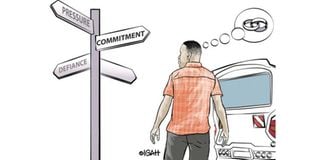Premium
Don’t rush to marry

Marriage is not the last train out of town, which, if you miss, you are stuck in back o' Bourke forever.
Years ago in the 'hood, I was housemates with my hommie, George. We both hustled and dreamed of a better life out of Jericho Estate.
George - aka Jijoh, aka Orgy - was a little older than me. As some of our friends were married, there was subtle pressure for us to marry. One issue George and I agreed about was we would not rush or be pressured into a lifetime commitment. We didn't want to be lessons, but examples.
Jijoh and I began jokingly calling ourselves, ngahika ndeenda.
Ngaahika Ndeenda - Gikuyu for, "I Will Marry When I Want" - is a controversial play written by Ngũgĩ wa Thiong'o and Ngũgĩ wa Mirii in the 1970s. It covers post-colonial themes of class struggle, poverty, gender, culture, religion, modernity versus tradition, and marriage and family.
Back to Jijoh and Josaya. There were evenings when, after a hard day of hustle, instead of using each other's names while exchanging greetings, we would go: "How was your day, ngahika ndeenda?"
Many of our friends did not know what ngahika ndeenda meant. They thought it was a new Sheng terminology. We secretly called senior bachelors, ngahika ndeenda.
Societal expectations
To Jijoh and I, ngahika ndeenda meant we had complete control over our lives. It meant we would not succumb to societal expectations, but would take all matters into consideration, and do the right thing at the right time.
Ngahika ndeenda was not a cry of defiance, but a clarion call that defined our future. We knew there would be a "when" and the push of a "want", but the "will" was in our hands; not in those of time or time-honoured traditions.
My Form One CRE teacher taught me that marriage is a covenant between two people, a man and woman, who were once separate, to establish a permanent community in life and love; for life. Marriage is an institution that no man should enter into lightly, especially as it's about two important things; life and love. Marriage is not a competition. It is not a pageant for a man to show off his bae and babies.
For men who are not yet married, take your time. There is no harm in being a ngahika ndeenda. First, get yourself together. Listen, little hommie; marriage is not the last train out of town, which, if you miss, you are stuck in back o' Bourke forever.
Godly institution
Being a ngahika ndeenda does not mean a man snubs the importance of this Godly institution. It does not mean a man is afraid of responsibility. It means a man is exercising his inalienable rights. It means a man is saying, "I do" to himself, his dreams, calling, joys and passions till such a time as he feels it is right to factor in another person into the equation.
Back then, Jijoh and I used to peeve about the white wedding condition - complete with a convoy of bedecked Rangeys - that some girls slapped on suitors. It is such unrealistic demands, carved in an 18-karat diamond ring, which push some men further into ngahika ndeenda territory.
"White wedding?" Jijoh would gasp. "Wapi? And I'm in the red, bro. Ama she means white rice?"
"She means what you're good at, Orgy," I would joke.
"What?"
"White lies!"
Seriously, though, being a ngahika ndeenda is a position of absolute power, to make a conscious choice about your future. It's a place where a man decides the train he will take, when and where.
To all ngahika ndeendas, three aces were put in your hands by God; will, when and want.
Your cards, your call, hommie.




